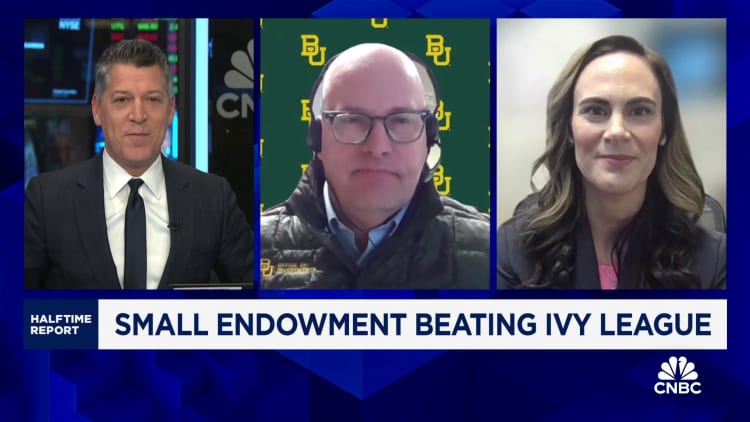
Barring a $1 billion donation or broad-based student loan forgiveness, college is becoming a path for only those with the means to pay for it, many reports now show.
But some colleges have a new strategy to entice students wary of the high cost.
Roughly two dozen schools have introduced "no-loan" policies, which means they are eliminating student loans altogether from their financial aid packages.
"They are giving them out like candy now," said Menaka Hampole, an assistant professor of finance at Yale School of Management, of the growing number of no-loan policies.
Among the schools on The Princeton Review's "The Best 389 Colleges" list, 23 promise to meet 100% of their undergraduates' financial need without loans.
"Post-Covid, more schools are rolling out no-loan policies mostly on the back of Princeton, which had the money in its endowment to do something," Hampole said.
"Princeton takes the lead and other schools follow suit — but it's the top universities that can afford to do this," she added.
Nationwide, colleges continue to feel the consequences of fewer students and declining tuition revenue, according to Colin Hatton, senior consultant of NEPC's endowments and foundations team. For the most part, college endowments have paid the price.
"The higher educational system is under stress," Hatton said.
'No loan doesn't mean free'
Of course, even without loans, students may still be on the hook for the expected family contribution, as well as other costs, including books and fees. There could also be a work-study requirement, depending on the school.
Even if a school has a no-loan policy, that also does not prevent a student or family from borrowing money to help cover their contribution.
"No loan doesn't mean free," said Robert Franek, The Princeton Review's editor in chief and author of "The Best 389 Colleges."
Colleges with no-loan policies
"College is expensive — we have to make sure we keep it accessible," said Nicole Hurd, president of Lafayette College in Easton, Pennsylvania.
At Lafayette, families with household incomes of up to $200,000 have their financial need met through grants and work study, without any loans.
"We have a moral obligation to make sure our low- and moderate-income families know that college is the best investment you'll make in yourself," Hurd said.
More from Personal Finance:
FAFSA 'loophole' lets grandparents help pay for college
Biden to forgive $1.2 billion in student debt for more borrowers
This could be the best year to lobby for more college financial aid
Colby College in Waterville, Maine, has had a no-loan policy in place since 2008.
Terra Gallo, a senior majoring in environmental policy, said "Colby's no-loan policy and the fact that demonstrated need is met and accounted for was something that was important to both me and my family."
"I know a lot of people who are in significant debt," Gallo, 21, added. "That was something I didn't want."
Colby senior Jackie Hardwick of Jacksonville, Florida, also said the cost of attendance was the main thing she considered when looking at colleges.
"That was the No. 1 concern on my mind," she said, highlighting Colby's support for financial aid and QuestBridge scholarship recipients like herself.
Hardwick, 21, who is a global studies and East Asian studies double major, said she would not be enrolled at Colby without her scholarships or if she had a larger expected family contribution, which she said is still "pretty hefty." Hardwick works six part-time jobs on campus to support herself and her family's expected contribution.
"I have to help my family out whenever I can," she said.
"For us, the no-loan message is incredibly powerful, especially when so many families are grappling with the very real concerns about the cost of higher education," said Randi Maloney, Colby's dean of admissions and financial aid.
A student's greatest concern: 'too much debt'
"These schools have addressed the biggest concern for students and parents, which is assuming too much debt," Franek said.
"They are saying to students and parents, 'I see you and I hear you,'" he said.
Further, such programs will likely result in more students applying, which can also boost a college's yield — or the percent of students who choose to enroll after being admitted — which is an important statistic for schools, Franek added.
These schools have addressed the biggest concern for students and parents, which is assuming too much debt.Robert Franekeditor in chief of The Princeton Review
"It is a win-win for schools and students," Franek said.
"Typically, you will see a fairly sizable increase in the number of admissions applications," said Forrest Stuart, Lafayette's vice president for enrollment management.
"It puts your school on the map," he said. "The more you can have your name out there, the more robust class we can put together."
— Jared Mitovich contributed to this report.
Subscribe to CNBC on YouTube.
Don't miss these stories from CNBC PRO:
- Berkshire Hathaway is one of the most overbought stocks on Wall Street. Here are the others
- Want an Nvidia alternative? These 6 chip suppliers look set to gain big from the AI boom
- Jefferies says buy this under-the-radar software stock with ties to Nvidia and nearly 20% upside
- 'Opportune time to invest in real estate': Pros name 5 REITs to buy right now


